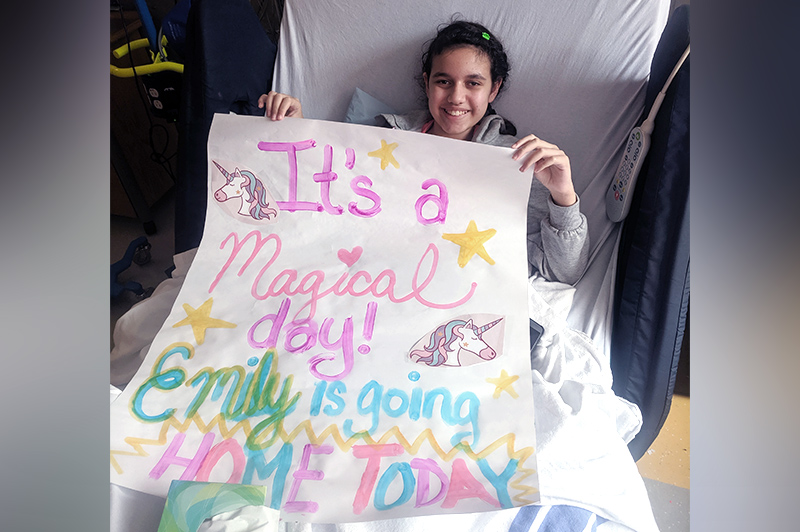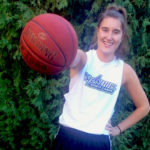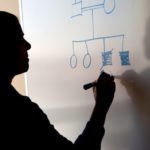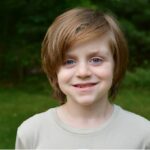‘Mom, my brain feels better.’ One mother’s story of her daughter’s fight with epilepsy

Liliane has a lot to be grateful for this holiday season. Until just this year, her 16-year-old daughter Emily, who has epilepsy, suffered relentless seizures that left her temporarily unable to speak or stand. The seizures began when Emily was 4, and living her life around them was all she knew. But today, Emily is seizure-free and learning to embrace a brand-new life thanks to the Epilepsy Center at Boston Children’s Hospital.
Finding a sense of hope
Emily’s doctors near her home in the Philadelphia area tried several approaches to control her epilepsy, including medications, specialized diets, and surgery, but the frequency and intensity of her seizures only got worse; they impacted her schooling, friendships, and most of her hobbies.
Liliane was heartbroken seeing Emily suffer and wondered what else to do — and where else to go — to help her daughter.
“We had always been told that Boston Children’s is the best, but I just didn’t want to make Emily trek all the way there,” Liliane says of the nearly six-hour drive.
In 2019, a post-operative hemorrhage in Emily’s brain led to months in a pediatric intensive care unit (PICU) and in-patient rehab. That’s when Liliane decided to finally contact Boston Children’s.
“They told us they were going to try everything to help Emily,” Liliane says of the Boston Children’s team. “They gave us a lot of hope.”
Mapping a way forward
Emily and her family met with Dr. Phillip Pearl, Dr. Scellig Stone, and Dr. Joseph Madsen of the Epilepsy Center. The team’s first move was to find out what caused Emily’s previous hemorrhage. What they discovered was von Willebrand disease, a bleeding disorder in which blood doesn’t clot properly because of low levels of the blood-clotting von Willebrand factor protein. Treatment for Emily included careful coordination with Dr. Riten Kumar of the Dana-Farber/Boston Children’s Cancer and Blood Disorders Center to navigate von Willebrand factor replacement therapies and close monitoring of her blood protein levels.
After a few false starts and setbacks, Emily’s levels stabilized enough for the Boston Children’s epilepsy team to move ahead with a brain mapping procedure to pinpoint the specific areas of her brain that were seizing and to determine the best treatment plan. For Emily, that meant two laser ablations using light energy to destroy her diseased brain tissue.
“Drs. Stone and Madsen were very transparent in telling us they couldn’t guarantee anything,” says Liliane of the treatment process. In addition to their honesty, Liliane appreciated the open and frequent communication she had with the team.
“They told us the good and the bad,” says Liliane. “They answered every question we had.”
Defying expectations
Almost immediately after her first laser ablation, Emily’s seizures decreased in frequency. What Liliane had clocked as minutes between seizures became hours.
“Mom, my brain feels better,” Liliane remembers Emily saying. “Something in my head feels different. I can rest.”
A new normal
Seizure-free following her second laser ablation last February, Emily is now navigating life as an independent high schooler.
“She never felt like a regular child because of her seizures,” Liliane says. “But she’s learning every day.”
Liliane and her family are learning every day, too.
“I’ve spent Emily’s whole life guarding her and directing what she could and couldn’t do: little things that people take for granted like showering, shopping, walking the dog,” says Liliane. “But now she’s slowly figuring out how to do these things all by herself.”
“It’s good,” Liliane says. “And it’s going to continue to be good.”
Learn more about the Epilepsy Center at Boston Children’s Hospital.
Related Posts :
-

Fighting for answers: Innovative approach to epilepsy helps Emma thrive
As a nurse, Lynda Coto was used to solving problems — until she was faced with her own daughter’s ...
-

Enjoying life, finally free of seizures
Kristen Grip stood in the middle of the basketball court, motionless. Around her, the action continued as usual — the smack ...
-

Diving deep on epilepsy genetics
When child neurologist Annapurna Poduri, MD, MPH finished her clinical epilepsy fellowship at Boston Children’s Hospital in 2004, she was ...
-

A true hero’s journey: How a team approach helped Wolfie overcome pancreatitis
Wolfgang, affectionately known as “Wolfie,” is a bright and energetic 7-year-old with a quick wit and a love for making ...





